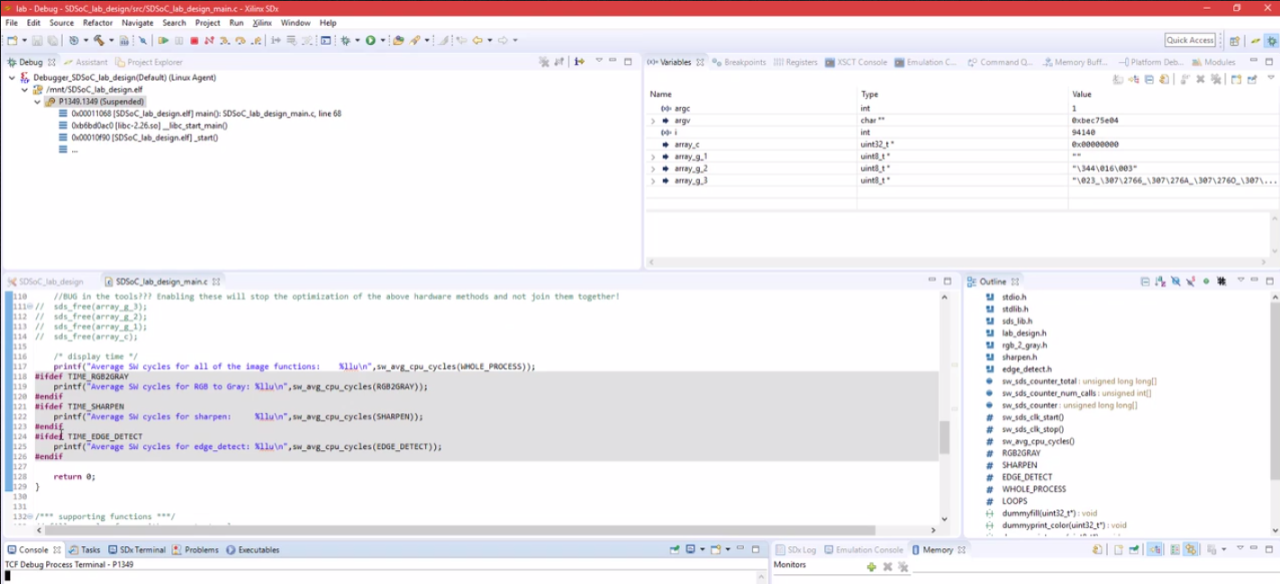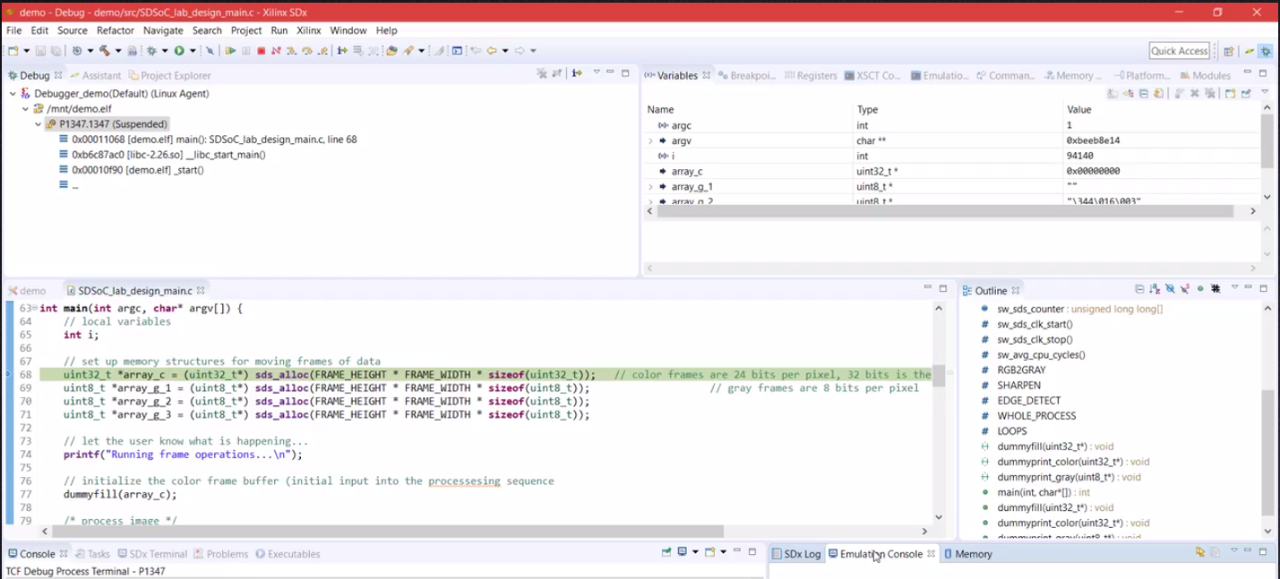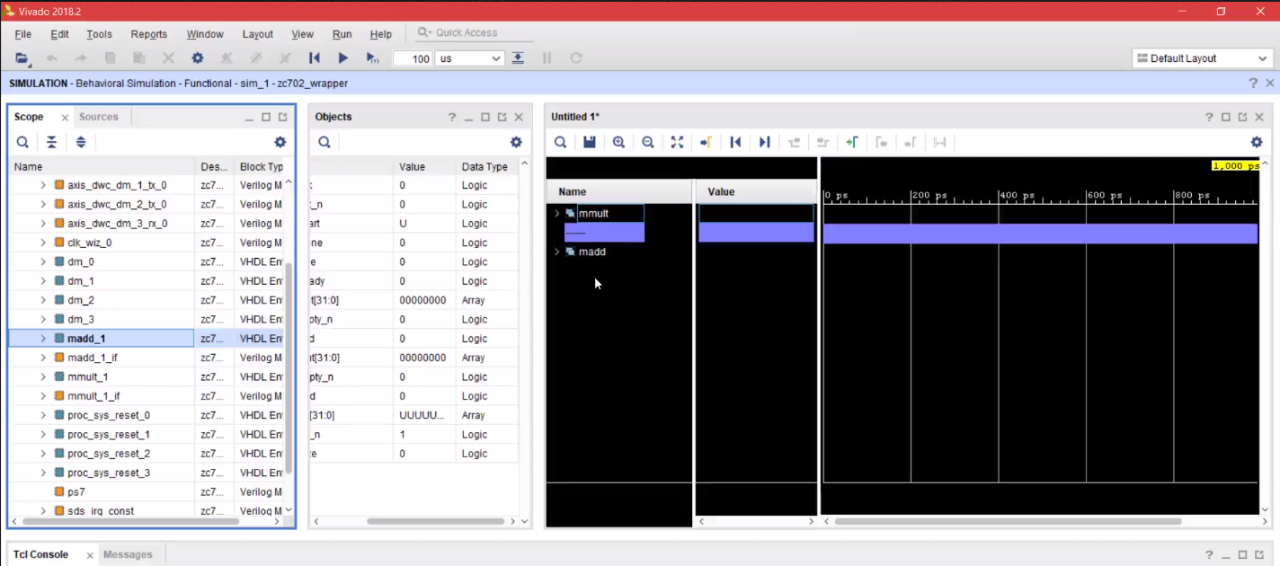Embedded Software & Ecosystem
- Developer Tools
- Embedded Software
Embedded Software Infrastructure
Enabling Embedded Developers with Necessary Components
- Overview
- Build & Development Tools
- RTOS & Libraries Partners
- Soft Processor Cores
- Embedded Linux
- Open Source Projects
AMD and its Ecosystem Partners deliver embedded tools and runtime environments designed to enable you to efficiently and quickly move from concept to release. We provide you with all the components needed to create your embedded system using AMD Zynq™ SoC and Zynq™ UltraScale+™ MPSoC devices, MicroBlaze™ processor cores, and Arm® Cortex® M1/M3 micro controllers including open source operating systems and bare metal drivers, multiple runtimes and Multi-OS environments, sophisticated Integrated Development Environments, and compilers, debuggers, and profiling tools.
Out of the box support for advanced features such as security and virtualization software drivers built on our unique Zynq SoC and Zynq UltraScale+ MPSoC devices enables you to develop smarter, connected, and differentiated systems.
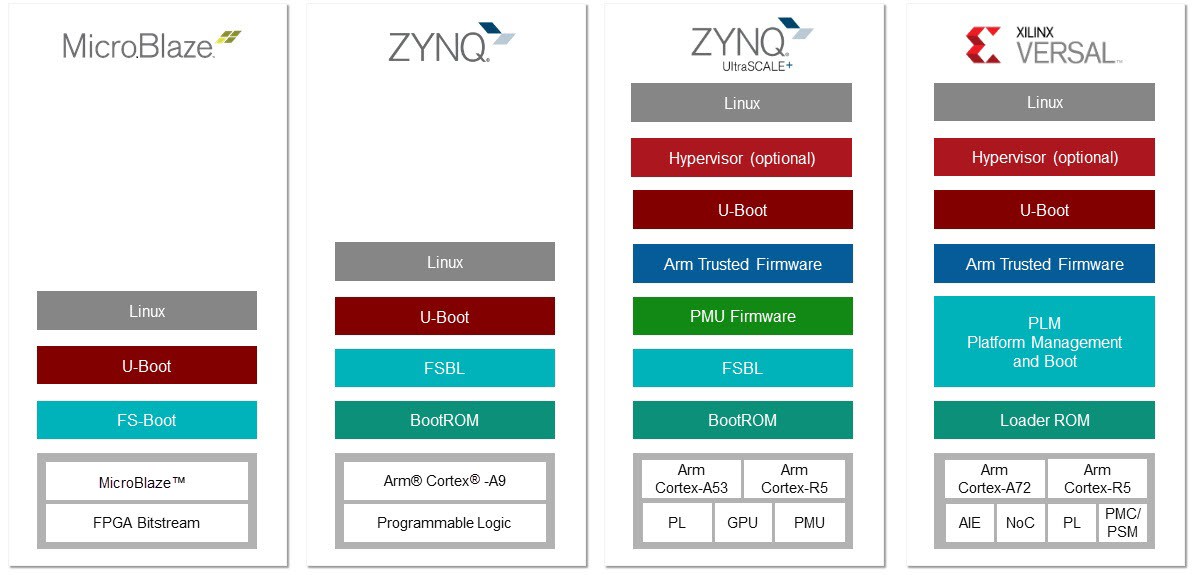
Linux
AMD Linux is the most prevalent operating system used by AMD products. AMD provides the PetaLinux tools for a simplified Linux development flow, as well as source code and Yocto recipe files from our GIT repository such that Linux support for AMD silicon can be supported by in-house build systems or 3rd party tools. The AMD Linux project is a customized non-commercial Linux development project catered towards development on Versal™ ACAP, Zynq™ SoC and MicroBlaze™.
The Linux kernel support for the AMD releases are:
- 2017.x is 4.9
- 2018.x is 4.14
- 2019.x is 4.19
Development Tools
The new Vitis™ unified software platform, AMD Software Development Kit (SDK), and Ecosystem Partner tools offer a wide choice of development environments that enable SoC-like C/C++ programming of the Zynq and MPSoC platforms.
| AMD Software Environments |
|---|
|
| Ecosystem Software Development and Tools |
Build Tools
AMD offers two tools to build and deploy Emebdded Linux solutions. These are PetaLinux BY AMD and the Open Source Project of Yocto. PetaLinux offers the user a GUI to quickly build the Embedded Linux and Yocto can be used by more experienced users to custom based Linux for their boards.
AMD products are supported by comprehensive set of open source resources to develop, boot, run, debug and maintain your Linux based application for a AMD SoC or emulation platform. We offer example applications, Kernel configurations, Yocto recipes, Multiprocessing and Real-time solutions, device drivers and Linux open source developer will find familiar sources, tools, and support forums to learn, develop and interact with others of like interests, needs and passion.
Pre-Built and Open Source Images
Building the Kernel and Boot Images
Real Time Linux
Emulation Models and Drivers
RTOS
"A real-time operating system (RTOS) is an operating system (OS) intended to serve real-time application process data as it comes in, typically without buffering delays. (wikipedia.org)”
Key factors in an RTOS are keeping it simple and light weight. Other factors are minimal interrupt latency and contact thread switching latency. An RTOS is valued more for how quickly and how deterministically it can respond than for the amount of complexity it can handle.
FreeRTOS
The FreeRTOS kernel was originally developed by Richard Barry around 2003, and was later developed and maintained by Richard's company, Real Time Engineers Ltd.
FreeRTOS was a runaway success, and in 2017 Real Time Engineers Ltd. passed stewardship of the FreeRTOS project to Amazon Web Services (AWS). Richard continues to work on FreeRTOS as part of an AWS team.
FreeRTOS™ is a market leading RTOS from Amazon Web Services that supports more than 35 architectures and was downloaded once every 3 minutes during 2017. It is professionally developed, strictly quality controlled, robust, supported, and free to embed in commercial products without any requirement to expose your proprietary source code.(reference: https://www.freertos.org/RTOS.html)

Please refer https://www.freertos.org/RTOS.html for further information.
FreeRTOS kernel port is available for the following AMD processors:
| Processor | Device |
|---|---|
| 64-bit Cortex-A53 Application processor (APU) & 32-bit Cortex-R5 Real-time processor (RPU) | ZynqUS+ SoC devices |
| 32-bit Cortex-A9 Application processor (APU) | Zynq 7000 SoC devices |
| 32-bit MicroBlaze processor | All AMD device families |
More information about FreeRTOS on AMD Products can be found at AMD FreeRTOS.
AMD provides additional libraries and bare metal drivers. These libraries are developed specifically for AMD devices.
| Libraries |
|---|
|
More Information on bare metal drivers and libraries can be found at the AMD Wiki at: Bare Metal and Libraries.
RTOS and Bare Metal
| Operating System | Safety Certifiable | Zynq 7000 Support | Zynq UltraScale+ APU Support | Zynq UltraScale+ RPU Support | MicroBlaze Support |
|---|---|---|---|---|---|
| AMD Stand-alone (bare metal) Environment and AMD Software Development Kit (SDK) |  |
 |
 |
 |
|
| DDC-I DEOS |  |
 |
 |
||
| eSol eT-kernel |  |
 |
 |
||
| eCOS |  |
 |
|||
| eForce |  |
 |
 |
||
| ENEA OSE |  |
 |
Contact Partner | ||
| Etas RTA-OS |  |
 |
|||
| Green Hills Software INTEGRITY |  |
 |
 |
||
| LynxOS 7.0 |  |
Contact Partner | Contact Partner | ||
| Mentor Nucleus |  |
 |
 |
 |
Contact Partner |
| Micrium uC/OS-II |  |
 |
 |
 |
 |
| Micrium uC/OS-III |  |
 |
 |
 |
|
| RTEMS |  |
 |
 |
||
| Sciopta |  |
 |
 |
 |
|
| Segger embOS |  |
||||
| Wittenstein OpenRTOS |  |
Contact Partner | Contact Partner | Contact Partner | |
| Wittenstein SafeRTOS |  |
 |
Contact Partner | Contact Partner |  |
| Sysgo PikeOS |  |
 |
 |
 |
AMP and Multi-OS Solutions
AMD provides its customers and partners with key technologies, documentation and support to enable advanced, multi-OS system designs on our products. Offerings available from our ecosystem include:
| Software | Zynq 7000 Support | Zynq UltraScale+ Support |
|---|---|---|
| Dave Embedded FreeRTOS/Linux on the Bora board |  |
|
| General Dynamics Mission Systems OKL4 |  |
|
| Green Hills INTEGRITY Multivisor |  |
|
| Lynx Secure Separation Kernel Hypervisor |  |
|
| Mentor Hypervisor |  |
 |
| Mentor Trusted Execution Environment |  |
 |
| QNX Hypervisor |  |
|
| Wind River Hypervisor | Contact Partner | Contact Partner |
AMD also supports the Open Source Project Open Asymmetric Multi Processing (OpenAMP). OpenAMP) is a framework providing the software components needed to enable the development of software applications for Asymmetric Multiprocessing (AMP) systems. Please see the Open Source (put link to the other tab) for more details.
Training
AMD offers designers a full suite of training and support options for their Zynq™ and MPSoC applications to include design methodologies, video tutorials, developer's forums, Wiki, on-line-support, design services, FAQs and Blogs to insure that your application gets to market on time.
Design Service Partners
| APAC | EMEA | India | Japan | North America |
|---|---|---|---|---|
| Avnet Design Service | Barco Silex | CoreEL Technologies | Image Technology | A2e Technologies |
| Huasang Electron Device | Missing Link Electronics | iWave Systems Technologies | Oki Information Systems | Ashton Electronic Systems |
| Realtime Technology | Plextek | Systec | Bottom Line Technologies | |
| QdeSys |
Tokyo Electron Device | DesignLinx Hardware Solutions, LLC | ||
| Sensor to Image |
Toshiba Digital Media Engineering | Digital Design Corp | ||
| Topic Embedded System B.V. |
DornerWorks | |||
| Xylon |
Fidus Systems | |||
| SYSGO GmbH | Missing Link Electronic | |||
| Hardent, Inc. |
Soft Processor Cores
MicroBlaze™ is the AMD FPGA-based, 32-bit/64-bit RISC Harvard architecture soft processor. It supports advanced architecture options such as AXI interface, Memory Management Unit (MMU), instruction and data-side cache, configurable pipeline depth and Floating-Point Unit (FPU).
The soft processor core is included with the AMD software tools and comes with the following three presets for the user:
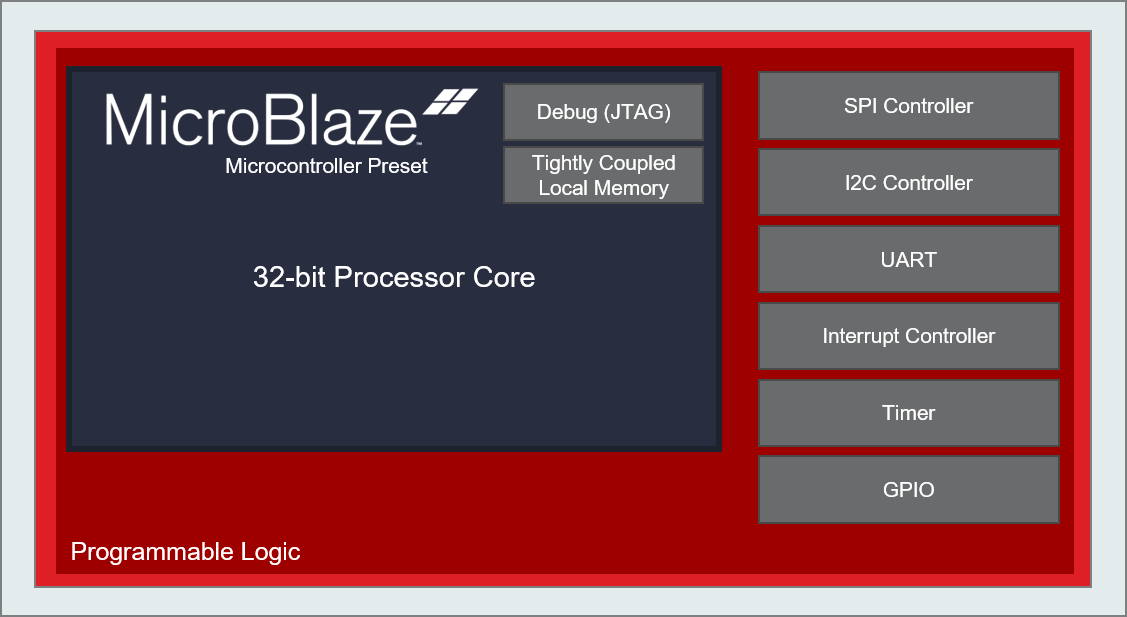 Click to enlarge |
Microcontroller Preset (up to 200DMIPs)
|
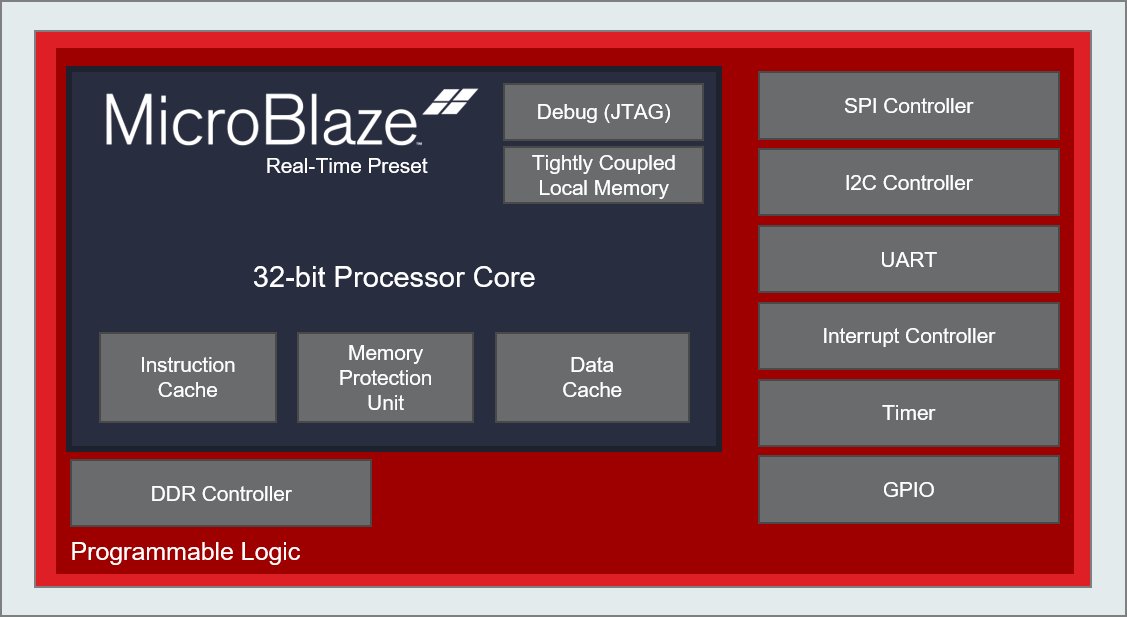 Click to enlarge |
Real-Time Processor Preset (up to 200DMIPs)
|
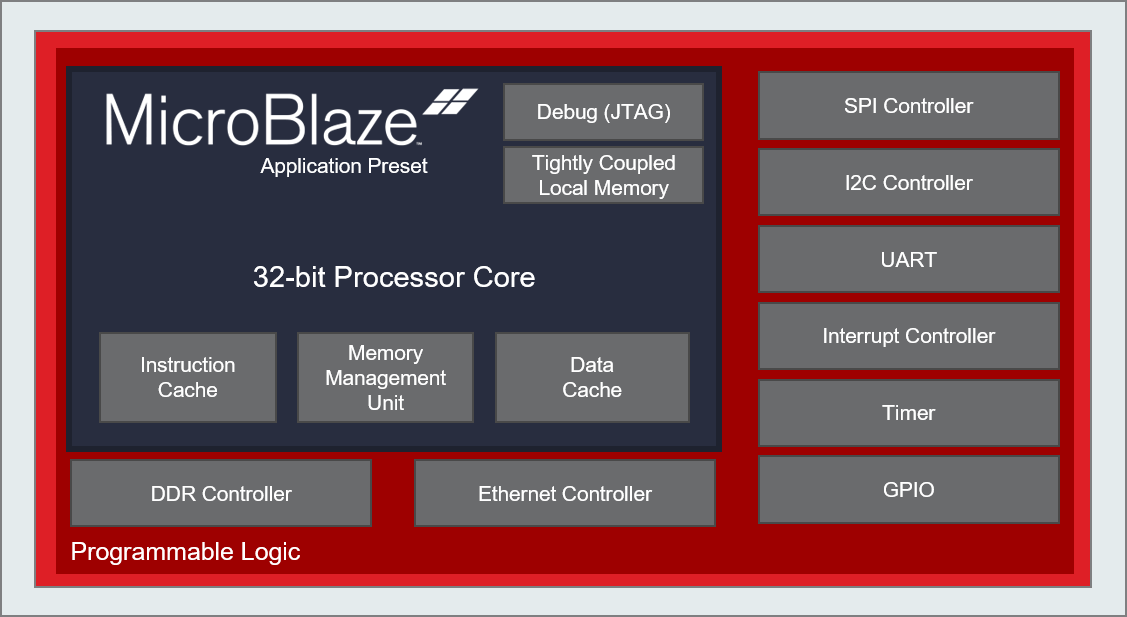 Click to enlarge |
Application Processor Preset (up to 180DMIPs)
|
The Cortex-M1 and Cortex-M3 processors are 32-bit processors designed for low power, low logic resources and low interrupt latency performance. The Cortex-M1 is designed very much for constrained applications, which require communication, control and management. While the M3 is intended for a wide range of embedded and IoT applications. To support forward compatibility the Cortex-M1 implements a subset of the Cortex-M3 instruction set and features.
AMD and its Ecosystem Partners deliver embedded tools and runtime environments designed to enable you to efficiently and quickly move from concept to release. We provide you with all the components needed to create your embedded system using AMD Zynq™ SoC and Zynq™ UltraScale+™ MPSoC devices, MicroBlaze™ processor cores, and Arm® Cortex®-M1/M3 micro controllers including open source operating systems and bare metal drivers, multiple runtimes and Multi-OS environments, sophisticated Integrated Development Environments, and compilers, debuggers, and profiling tools.
Linux
| Zynq 7000 SoC Support | Zynq UltraScale+ APU Support | Zynq UltraScale+ RPU Support | MicroBlaze Support | |
|---|---|---|---|---|
| Non-Commercial | ||||
| Linux, uBoot, more (AMD GIT) |  |
 |
 |
|
| Yocto/OpenEmbedded support |  |
 |
 |
|
| PetaLinux tools |  |
 |
 |
|
| Arch Linux ARM |  |
|||
| Ubuntu Linux | Certified Ubuntu for AMD Devices | |||
| Android |  |
 |
||
| Commercial Solutions | ||||
| Enea Linux |  |
|||
| Mentor Embedded Linux |  |
 |
||
| Suse Linux |  |
|||
| Sysgo ELinOS |  |
 |
||
Open Source Projects
AMD believes and participates in the Open Source community. The main focus and projects are below. There are also additional designs and information on the Hackster Community Portal.
AMD has been using Open Source Linux since it has introduced processors in their devices. The first was the Virtex-II Pro in 2001. Since that time AMD has utilized Open Source Linux and started to contribute with upstream patches since 2007. When Xilinx unveiled Zynq™ 7000 they started to really establish themselves in the Linux community. They now are one of the leading contributors to the Linux Uboot project.
Linaro is an open source project that developments software across the entire Arm Ecosystem. Linaro partners with ARM to co-maintain the Arm Ecosystem.
As stated on the 96boards page “96Boards is a range of hardware specifications created by Linaro to make the latest ARM-based processors available to developers at a reasonable cost. The specifications are open and define a standard board layout for SoC-agnostic (processor independent) development platforms that can be used by software application, hardware device, kernel and other system software developers.”
The 96Board with a AMD device is an Ultra96 that is sold by Avnet. There is development by Avnet, AMD and the Linaro community on the Ultra96. For more information visit http://zedboard.org/product/ultra96-v2-development-board
OpenAMP is a Linaro Community Project that seeks to standardize the interactions between operating environments in a heterogeneous embedded system through open source solutions. The OpenAMP Initative include the following items
- OpenAMP is an open AMP framework that includes two efforts:
- A standardized way of using AMP
- A clean-room open source implementation/project
- OpenAMP currently includes the following components:
- Lifecycle operations - Such as start/stop another environment
- Messaging - Sending and receiving messages
- Low level abstractions – Sharing memory, inter-processor interrupts, …
- Proxy operations - Remote access to services, e.g. file system
- Under development: Resource configuration using System Device Trees
- Built on top of existing open source projects/standards
- RemoteProc, rpmsg, Virtio, Device Trees
- Accelerate adoption by working in open source
- Linux and RTOS implementations
As the Yocto Project states: “The Yocto Project is an open source collaboration project that helps developers create custom Linux-based systems for embedded products, regardless of the hardware architecture. The project provides a flexible set of tools and a space where embedded developers worldwide can share technologies, software stacks, configurations and best practices which can be used to create tailored Linux images for embedded devices.”
